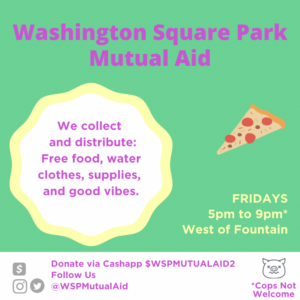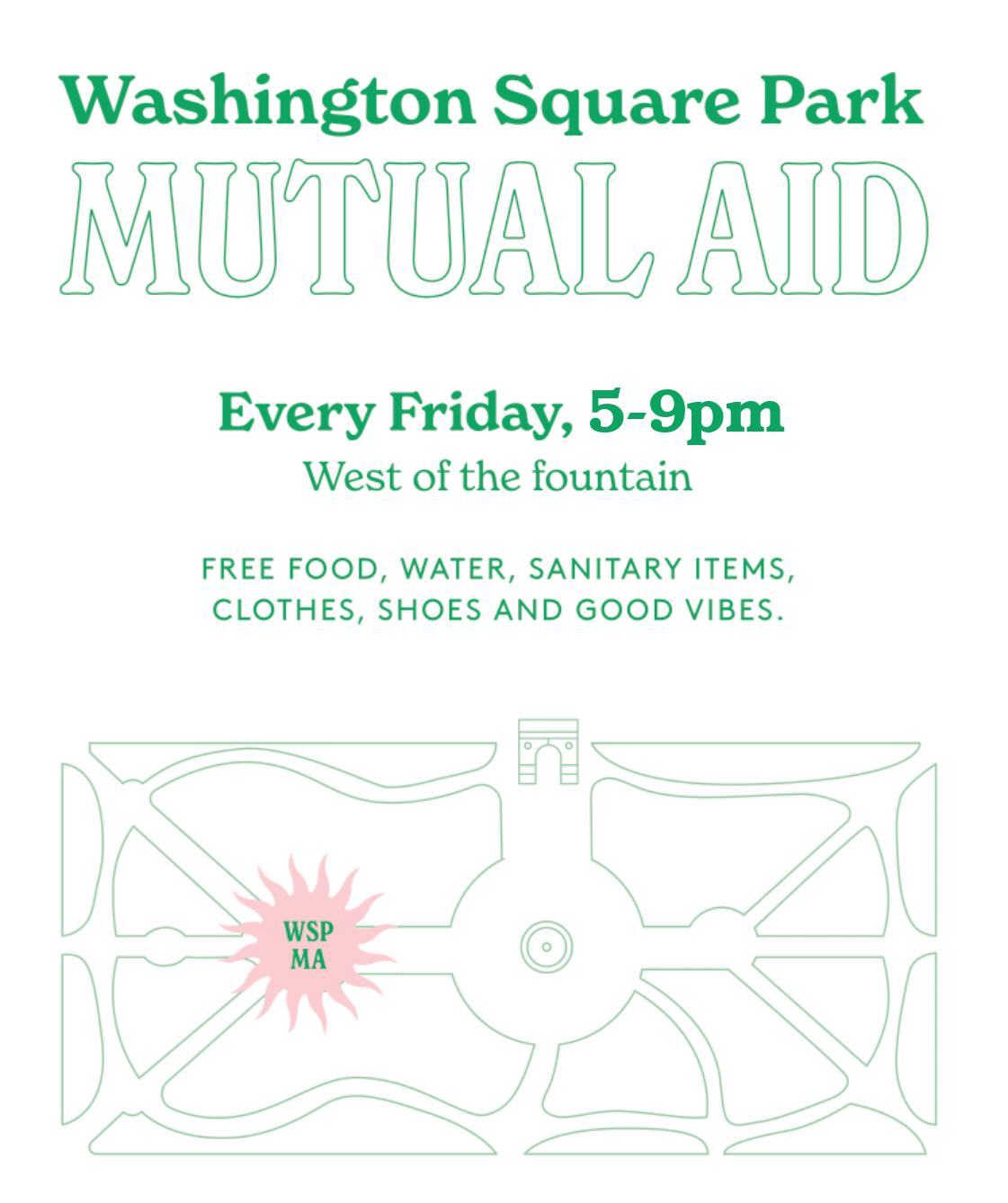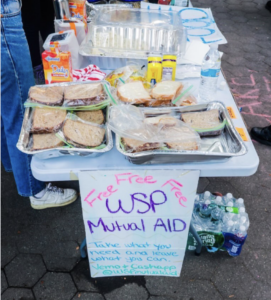Valerie Peter Chong, Program Coordinator with CUFPI, interviews organizers with Washington Square Park Mutual Aid (WSPMA) who have chosen to remain anonymous due to the group’s commitment to anarchist values and concerns about State intelligence. They will be referred to by the names Toph and Lucy for the purposes of this article. The interviewees discuss the origins of WSPMA, the services they provide, and how mutual aid values are reflected in the day-to-day processes of their organization.
Special thanks to Yukari Izumiyama for her assistance with transcribing, editing, and researching articles to include in this interview.
VALERIE PETER CHONG (VPC): PLEASE GIVE US A BRIEF DESCRIPTION OF WSPMA.
TOPH: In June 2021, when the curfew started at Washington Square Park, a small group started. A few people wanted to start doing Mutual Aid. I don’t know if they were talking about it in that capacity yet, but I remember it was right by the fountain, by the arch. People were just giving away food and clothes, trying to support as needed because there were mass arrests that first night of curfew: very violent NYPD’s Strategic Response Group (SRG) arrests. NYU students and the constituent residents of West Village were starting to come back (after the COVID-19 lockdown). To respect- and definitely quote “respect”- their desire for a sterile park and a sterile neighborhood, the police came in to get rid of everybody who did not fit the white, cis, hetero, upper-class image of what NYU and Washington Square Park could be. (Overtime) it started to build momentum with more people and more resources: resources all being donation-based and volunteer-based. I think the majority of us met during the 2020 uprising movement, the protests. Now, we’re two-plus years into it. Since the beginning of June 2021, we’ve only missed one Friday. I think (we’ve become) a mainstay of consistency, transparency, and trust.
LUCY: I feel like for a lot of people, it’s like the most consistent part of their life. I guess, even for me as an organizer, you always know what Friday is going to be like. There’s going to be a community there. There’s going to be good food. There’s going to be water. It’s a beautiful thing that people can rely on that space being there every Friday.
VPC: CAN YOU TALK A LITTLE BIT ABOUT THE PROCESS OF ACQUIRING RESOURCES, SOURCING FOOD AND CLOTHING, AND FUNDRAISING?
LUCY: Our main (method) is that we put a-weekly-ask on Instagram every week and to share what we need. Those get a lot of traction and a lot of people reply. Mostly we’re relying on small donations from people who maybe just cleaned out their closet and have like 10 shirts to give away. Sometimes people just make cookies or whatever, and they bring them by. It really does come a lot from individual people who just contribute at a small level. We kind of provide the space and the tables for those donations to go. Usually, we have tables full of stuff, but not always. A few local establishments bring by food when they can- their leftovers, and a thrift store in the East Village gives us many clothing donations.
TOPH: It is so beautiful. Some community members cook weekly, always hot, home-cooked meals. There is always a vegan option. It’s really, really good food.
LUCY: We also do a bulk pizza order with funds that we gather from donations. A lot of people donate smaller amounts, and then it just accumulates. We redistribute those funds to pizza, water, plates, and little items like that. It’s really just everyone bringing stuff by. It makes it work somehow. It’s really beautiful.
TOPH: During the (homeless encampment) sweeps in the summer of 2022, (WSPMA) became a resource for crowdfunding to buy sleeping bags, tents, and other supplies to distribute to the unhoused communities. Often we have Narcan that we give out, hygiene supplies. We host skill shares: Stop the Sweeps, Narcan, Cop Watch, and Jail Support. Different individuals have gotten very involved in supporting the community with the skills that they have. For instance, as a social worker, I’ve been able to help coordinate services for some of our community.

VPC: WHAT DOES MUTUAL AID MEAN TO YOU? AND HOW IS IT DIFFERENT FROM OTHER SIMILAR ORGANIZATIONAL STRUCTURES THAT SEEK TO HELP OTHER PEOPLE?
LUCY: There’s a number of things, but for the most part, I think mutual aid means there are no strings attached. You don’t have to go through a long bureaucratic process. We’re not gonna ask you a bunch of questions to make you prove that you really need help. Just understanding that we are a living organization that changes, so it doesn’t make a lot of sense to have a strict structure or hierarchy. We go with what the people who are there and are part of the community want, and we recognize that that can change. With a 501(c)(3), there can be a lot of restrictions on how you spend your money. There’s a possibility that (funders) have opinions on political actions that we take, and when you register for a 501(c)(3) there’s more governmental oversight. I guess being a mutual aid rather than a charity, you have a lot more freedom to help the community. A lot of us distrust nonprofits because they’ve always been around. You hear that they’re doing all these things, but no one is seeing the actual results of that. We recognize that those systems have problems.
TOPH: I am dependent on this community. It has become my chosen family. The thought of it ever falling apart breaks my heart. I think we each get something different from this work. There’s the mutuality piece of it because it’s just imperfect humans trying to make a better world.
VPC: HOW ARE DECISIONS MADE? WHAT DOES THE DECISION-MAKING PROCESS LOOK LIKE?
LUCY: We have a few different group chats (for food, clothes, social media, etc.) and one main logistics chat.
TOPH: Typically, somebody will put something in the chat. Different reaction emojis will correspond to different options. If you don’t vote, you’re fine with whatever. You also have the option to object and then we go through a process of reworking the options to better reflect the needs of the community. It’s consensus decision-making. We also have bi-monthly meetings to discuss issues and identify anything we need to make decisions together on.
LUCY: For bigger decisions, we try to have a conversation in the park and include more people, acknowledging that not everyone who’s in our community has access to phones and chats.
VPC: HOW DOES WSPMA ENGAGE IN ADVOCACY, ACTIVISM, OR POLITICAL ORGANIZING?
LUCY: We’re really plugged into the community, and there are so many people in precarious situations that we want to advocate against or show solidarity for. I think it’s impossible to separate (this from mutual aid) and ignore larger issues that are happening to our community members and our friends. Fridays are amazing, but it kind of leaves you still feeling like there’s so much love to do. We’re just there one evening on a Friday, but these people’s lives continue all week long. What are some other ways that we can help them and show solidarity and show up? When a neighbor says they have a sweep notice, we’ve been really good about showing up for our unhoused neighbors who need support, not just on Fridays.
TOPH: I like to think of what we’re doing on Friday as planting a seed in people’s heads of how you can help your community every day. I know it’s created a forest in my own mind.
VPC: IS THERE ANYTHING ELSE YOU WANT TO ADD? HOW COULD OUR READERS SUPPORT YOU ALL?
LUCY: If you follow us on Instagram you’ll see the things that we need each week. It’s the main way that people can communicate with us and reach out to us other than just showing up. Everyone has different skills; everyone contributes to mutual aid differently. Some people want to come to help serve food. I also think it’s just as helpful to come and talk to people who look like they need someone to talk to.
TOPH: Share with your community that this is a way to help others. I think word of mouth is huge, and Instagram is a great way to engage with us.
LUCY: It also doesn’t necessarily have to be about WSPMA. A lot of people don’t know about mutual aid or know what mutual aid is. So, even using those words makes people curious.
TOPH: Bedding is also really important. Obviously, clean-non-bugged bedding. Bedding is really important, any old camping supplies. If you stay in hotels, take the little mini hygiene supplies and drop them off. Or the little pack from the dentist, or any extra plastic cutlery that you get from food delivery. It’s about opening your mind: “What do people need?” “What do I have that people need?”
VPC: I REALLY LOVE THIS OVERARCHING THEME OF LEARNING TO HAVE MORE OF A COMMUNITY MINDSET. I THINK THAT THAT’S A BIG PART OF MUTUAL AID, TOO, BECAUSE IT GOES BEYOND “I’M DOING THIS FOR SOMEONE,” TO “I’M DOING SOMETHING FOR THE COMMUNITY THAT IS ALSO FEEDING ME.” METAPHORICALLY AND LITERALLY FEEDING.
TOPH: Totally. I remember once I forgot my gloves and another community member told me to take a pair of gloves from the pile. I felt guilty because I could technically afford to buy them. But she said, “Toph. You just brought 18 bags [of gloves], you can take one pair.” It’s about learning that I’m part of this community. I’m not better because I brought stuff. This is what I need. Drop off what you can, and take what you need.
ABOUT THE INTERVIEWEES
Washington Square Park Mutual Aid (WSPMA) began in the wake of brutal violence and criminalization of the park’s residents by the NYPD. Determined to care for our community and counter the fearmongering of the poor and unhoused, WSPMA distributes free food, clothing, and other survival supplies to all. WSPMA’s mission is to provide survival supplies to the WSP community while building the knowledge, tools, and power for all to work for more than just survival. WSPMA aims for total liberation through political education, coalition-building, and creating a hub of power and organizing within the community.

